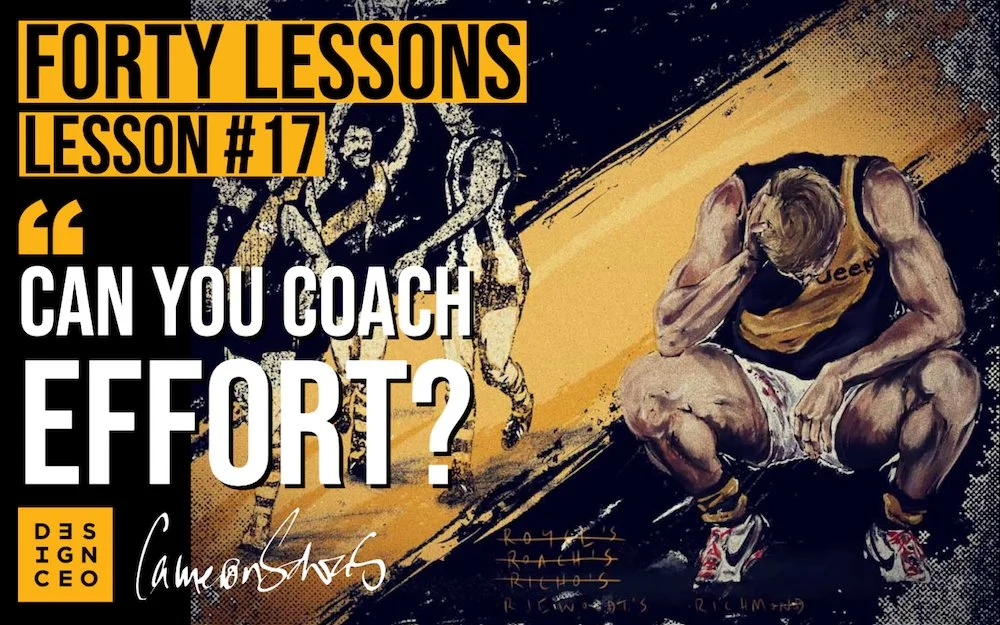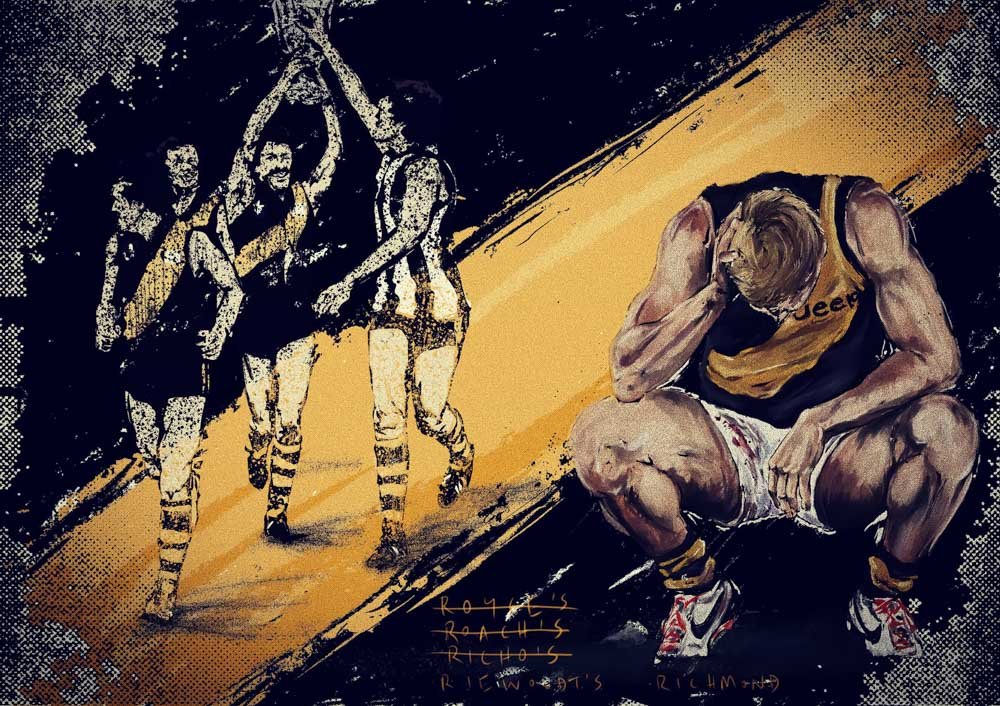Lesson #17 - Can you coach effort?
Can you coach effort?
When listening to commentary surrounding elite team sport, the many post-mortems seeking to explain why one team won and their opponents lost, who performed well while others disappointed, the conversation will inevitably deal with notions of ‘effort’.
While often hidden in the myriad of data points and video analysis, what is being said is “The team that tried harder won”, particularly when seeking to explain a result other than expected.
“They didn’t come to play” is the term often used by expert commentators, former players and coaches, who have a very firm grasp on what ‘effort’ means at this level of competition, having deep experience with the variability of performance from week-to-week and season-to-season, but now sit a safe distance from the performance environment and its many uncontrollables and complexities, relieved of this responsibility.
That same term is often spoken in hushed tones by ‘inner sanctum figures’ huddling in corners of desolate aftermatch changerooms as the defeated team tries to make sense of something other than the desired and worked-for outcome. Just a few hours earlier, those same changerooms held so much hope. It is sport’s greatest juxtaposition.
I’ve been in those huddles countless times and been part of those conversations, somehow distancing myself from the responsibility for the outcome, a kind of ‘them and us’ mindset. As CEO of the club, this was bullshit, and I needed to be better.
One of my favourite leadership concepts (and lesson learned) is “Never blame the player”, and so it is with discussions around effort.
Given the overwhelming expectation of effort, when we perform at a level less than desired, or are outworked by the opposition, it is easy to point fingers and assign blame.
Human nature seeks out blame, knowing it will find friends easily, hence the corner huddles.
But there is no solution, and therefore no future, in blame. As leaders, we must rise above this proclivity.
I think of ‘effort’ in straightforward terms. Talent does not fluctuate, whereas effort does. An individual and team’s capacity to give maximum effort consistently provides access to the full range of individual and collective ability and potential.
Differences in ‘effort’ in elite sport are doubtless marginal, but so is everything. The cumulative differences, as small as they mostly are, separate all teams and are enough for one team to be Premiers, whilst another will be condemned to the bottom rungs of the ladder.
So it is with any group reliant on a team-based ethos for its success.
Yes, all the marginal differences add up, and while we can reconcile if a team is a little more skilled, experienced, faster and stronger, and this results in victory, we find it hard to make peace when the difference relates to ‘effort’.
I spent thirty years in elite sport, and I can say without fear of contradiction, that while the narrative used to explain wins and losses can miss the mark, effort is often the difference.
Losing in this way is understandably frustrating.
After all, shouldn’t highly paid, professional athletes playing in a high-stakes competition in front of tens of thousands of people who love them and the team they have the honour of playing for, always be giving their absolute best? “Have some pride in the jumper”, we hear from the grandstands (and in those corner huddles) as the margin on the scoreboard opens up, and the game is lost. It’s hard to build an argument against this contention, or soothe the disappointment supporters feel when they experience something other than a maximum effort from their team.
Clearly, we are talking about comparative effort, when one team manages to outwork its opposition and win the game.
It is easy to think of effort in a very one-dimensional form. It plays out in many different ways. Much of the work that goes into maximising individual and team effort happens away from the game itself. Building resilience, for example, occurs on the training track, when players learn they can take mind and body to previously unattainable levels.
The effort required to change embedded behaviours is arguably the most challenging for all of us. The curiosity to learn and the courage to unlearn mostly happens when nobody is watching, in times of reflection.
Changes in perceived effort are most apparent when a team improves significantly from one year to the next, or fails to play to its previous high standards. Something has changed such that ‘effort’ has changed, and now the team is winning games it would have previously lost, and vice versa.
My firm belief is that ‘effort’ can be coached, but not in the shouting, red-faced, vein-popping, finger-pointing ‘try harder’ cliche of coaching, so often the expectation. As with all things leadership, the process is complex and nuanced, and will ultimately be the difference maker.
The prevailing belief, so it seems, is that great leaders have the ability to ‘extract’ performance from a group, and there is some truth in this. We all need a hurry-up from time to time. But this practice must be used sparingly to retain its impact and value, for it will have diminishing returns.
In my experience, great leaders have the capacity to ‘unlock’ performance from both the individual and the team, often by recognising capability and opportunity they are yet to see in themselves, and then by providing a pathway to achieve it.
The role of leaders is to create the conditions that get the best from a group with all of its idiosyncrasies. No team is the same and will always require something different from its leaders.
As a full-time coach and mentor of leaders and their teams, I find myself drawing back to this framing:
“Does your team understand (and believe in) what they are collectively trying to do, and are they profoundly motivated by this potential and making measurable progress towards its achievement, and understand their role, and those of their teammates, in this?”
There is both science and art in this process. You are leading a group of unique characters with their own desires, expectations, and human experiences.
While I am strongly geared to having a highly systematic and structured approach to this process, what we describe in elite sport as the ‘mechanics’, this alone, is unlikely to be the difference maker.
The difference is the leader’s ‘feel’ for the individuals in the context of the team, and the team itself. We define this as the ‘dynamics’, the means by which we embed a personal and team commitment to the execution of the ‘mechanics’, which will constantly evolve as the group faces new challenges and possibilities.
It is with the ‘dynamics’ where the better leaders thrive. The many personalities and their varying interactions, egos and insecurities, experiences shared, successes and failures, relationships tested, friendships and otherwise, cliques formed and broken – it is a veritable hormone soup of human behaviours, but a well-led team, with great mechanics and dynamics, find a way, unique to this group.
Mechanics and dynamics, the science and art of leadership, to create the conditions of high performance.
I have spoken previously of leadership as a conversation. Trust always precedes progress, and you can only ‘push’ to the level of trust you have built, enabling conversations like “We need you for what you can do … but only if you understand it cannot be about you.”
You cannot win unless you get the mechanics right, but mechanics alone, will never guarantee success. Mechanics can also blind leaders, too stubborn or proud to break away from a preconception of what a group needs to succeed, as though they are trying to prove a hypothesis or thesis on how the game should be played, and in doing so, personalising their disappointment.
As a leader, charged with building a high-performance culture, I made this error, and it was a profound learning. But as I write this, mostly reconciled, I understand that I have no message worth sharing with you if not for my mistakes, failures, and setbacks.
Leadership is a craft that can be learned, often the hard way.
Play on!
Stay Connected
Please subscribe to our “In the Arena” email.
From time to time to time we will email you with some leadership insights, as well as links to cool stuff that we’ve come across.
We will treat your information with respect and not take this privilege for granted.




